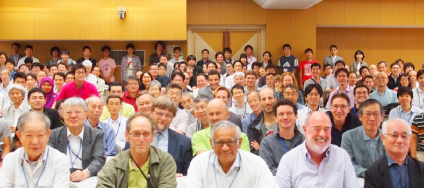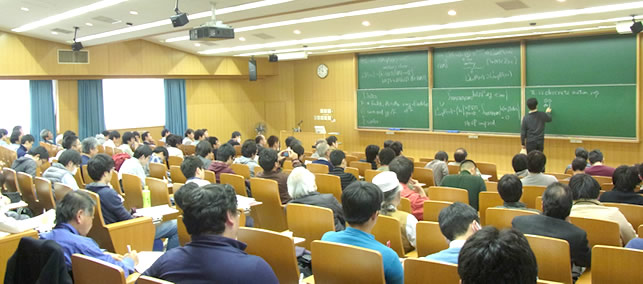On November 2018, RIMS was certified as one of the International Joint Usage/Research Centers by the Ministry of Education, Culture, Sports, Science and Technology (MEXT).
Request regarding Research Paper Acknowledgements
Childcare Services during Joint Research Activities
It is possible to set up a temporary nursery on campus during research meetings for the use of researchers with children.
For details, please contact the organizer of the meeting you are attending or the Cooperative Research Service Section at RIMS.

List of RIMS Research Projects
To promote research on theory and algorithms in the field of mathematical optimization and to contribute to the further development of the research community in Japan, we plan to organize workshops and research meetings and invite world-class researchers in related fields.
Mathematical optimization (mathematical programming) problems are those of maximizing or minimizing an objective function under given constraints, and frequently appear in various fields such as natural science, engineering, economics, and information science. For mathematical optimization problems, it is important to elucidate the structure and properties of optimal solutions and to construct algorithms that can compute optimal or good approximate solutions quickly. Especially in recent years, there is an increasing need to solve large-scale optimization problems with more complex constraints such as semidefinite constraints, second-order cone constraints, and mixed integer constraints, and which are represented by large data sets. Therefore, it is necessary to develop a new theoretical framework to understand the mathematical structure behind optimization problems and to design high-performance algorithms based on this theory.
In this project, we plan to organize international workshops and research meetings on mathematical optimization with the aim of further promoting and developing theoretical and algorithmic research in mathematical optimization. In order to further strengthen the reseach areas where research groups in Japan are leading the world, the workshops will focus on lectures on these areas.
・ Discrete optimization: discrete convex analysis, algorithmic graph minor theory
・ Continuous optimization: theory and algorithms of conic optimization
・ Integration of mathematical optimization with machine learning, and practical applications of mathematical optimization
We will also invite world-class researchers in these fields to these workshops to exchange information and promote research exchanges. Two or three of them will be invited to stay at RIMS for a few months as leading researchers to develop mathematical optimization research through joint research with researchers in Japan.
-
Location: Room 420 Period: 2025-05-12〜2025-05-16
Organizer: SHIOURA Akiyoshi(School of Engineering Department of Industrial Engineering and Economics, Institute of Science Tokyo)/DEZA Antoine(Department of Computing & Software, McMaster University) -
Location: Institute of Science Tokyo Period: 2025-05-26〜2025-05-29
Organizer: SHIOURA Akiyoshi(School of Engineering Department of Industrial Engineering and Economics, Institute of Science Tokyo) -
CONTO-Cones: Theory and optimization (RIMS Research Project 2025)【RIMS Symposia】
Location: Room 420 Period: 2025-12-01〜2025-12-03
Organizer: SHIOURA Akiyoshi(School of Engineering Department of Industrial Engineering and Economics, Institute of Science Tokyo)/BRUNO Figueira Lourenço(The Institute of Statistical Mathematics)
Higher structures have emerged as a new eld in mathematics, as well as in mathematical and theoretical physics. Covering many di erent topics, this eld encompasses the following areas: moduli spaces, defor mation theory, derived geometry, enumerative geometry, representation theory, homotopy algebras, Poisson geometry and quantization, mirror symmetry, string theory, and quantum eld theory.
Higher structures refer to the structures introduced into various elds of mathematics by treating the objects of study as objects in higher categories. In many elds, this point of view has led to the discovery of hidden structures, often yielding deep new insights into the research area. Over the years, homotopy theory has developed powerful tools for dealing with higher categories, and as a result, the study of higher structures often involves introducing techniques from homotopy theory into other elds of mathematics.
In deformation theory, this means replacing Lie algebras with L or homotopy Lie algebras. In algebraic geometry, the ring of holomorphic functions on a variety is replaced by a di erential graded algebra. In representation theory, representations on vector spaces are replaced by representations on categories. In enumerative geometry, counting invariants (which answer questions such as how many twisted cubic curves lie on a Calabi-Yau threefold? ) are replaced by the dimensions of certain vector spaces (such as Gopakumar Vafa invariants). Quantum eld theories are de ned as functors from higher cobordism categories to higher linear categories, to name just a few examples.
Even though they are investigating similar fundamental questions and adopting the same general higher structural perspective, di erent communities have mostly worked independently of each other. Indeed, the techniques developed by the di erent schools are quite distinct. These topics are extremely active and are related to many areas of mathematics and physics. One objective of this project is to bring together the various higher structure communities active in di erent areas and originating from diverse backgrounds such as algebraic geometers, di erential geometers, and mathematical physicists to encourage more interaction and cross-fertilization between the elds, as well as identify new emerging directions. The project will bring together leading experts and young researchers in these subjects to promote interaction and collaboration.
To this purpose, we plan to include a week-long school, where a series of mini-courses will be delivered by world-renowned leading experts, aiming to facilitate communication between the elds. We will also have workshops presenting recent research. In addition, we plan to run a weekly seminar during April-June 2026. Furthermore, there will be a number of informal series of lectures and mini-courses on related topics. In particular, the project will focus on lectures in these areas:
・ Higher structures in Moduli spaces and Enumerative Geometry
・ Homotopy algebras, deformation theory, and quantization
・ DG manifolds in geometry and physics
RIMS Symposium I (WS1)
Theme: School on Moduli Spaces in Various Flavors of Geometry , April 13-17, 2026
Organizers: Kai Behrend, Hsuan-Yi Liao, Kaoru Ono, Mathieu Stienon, Ping Xu
Mini-course speakers
・ Alexey Bondal
・ Barbara Fantechi
・ Kenji Fukaya
・ Bernhard Keller *
・ Hiraku Nakajima
(*) to be con rmed
RIMS Symposium II (WS2)
Theme: Workshop on Moduli Spaces in Various Flavors of Geometry , April 20-24, 2026
Organizers: Kai Behrend, Hsuan-Yi Liao, Kaoru Ono, Mathieu Stienon, Ping Xu
RIMS Symposium III (WS3)
Theme: Workshop on DG Manifolds in Geometry and Physics , March 8-12, 2027
Organizers: Hsuan-Yi Liao, Kaoru Ono, Mathieu Stienon, Ping Xu
The RIMS research project 2026 "The Mathematical Roads to QFT" will bring together worldwide leading mathematicians interested in the mathematical aspects of Quantum Field Theory, and their wide-ranging applications from high-energy physics to quantum simulation. It will take place at RIMS from April to July, 2026. The organizing committee is composed by C. Brennecke (IAM Bonn), S. Cenatiempo (GSSI L'Aquila), M. Falconi (Politecnico di Milano), F. Hiroshima (Kyushu University) and H. Ochiai (Kyushu University).
This project aims at stimulating scientific interactions between the different mathematical approaches to QFT, that range from probability theory and stochastic PDEs to operator theory and operator algebras, as well as statistical mechanics and microlocal analysis. The goal is to further advance our knowledge of QFT and its applications, with the ultimate goal of tackling the outstanding open problems in QFT such as the rigorous renormalization of physical theories, spontaneous symmetry breaking and critical phenomena.
The RIMS will host international guests both for the whole duration of the research project and for shorter visits. To foster an active and engaging participation of both experienced and young researchers, and stimulate interactions with the local community, some key events will be organized throughout the project, including an opening workshop in the second half of April, and a conference at the end of June. These events will offer a possibility, especially to young researchers, both to come in contact with the recent groundbreaking ideas, and to showcase and discuss the most recent advances in the field.
It is the commitment and hope of the organizing committee for this project to be successful in being a building block of new and exciting developments in the mathematics of quantum field theory.
Research Institute for Mathematical Sciences (RIMS)




